外研版八年级上册Module 11 Unit 1 In China ,we open a gift later.课件(共38张PPT)
文档属性
| 名称 | 外研版八年级上册Module 11 Unit 1 In China ,we open a gift later.课件(共38张PPT) |  | |
| 格式 | zip | ||
| 文件大小 | 13.2MB | ||
| 资源类型 | 教案 | ||
| 版本资源 | 外研版 | ||
| 科目 | 英语 | ||
| 更新时间 | 2022-08-04 13:09:39 | ||
图片预览

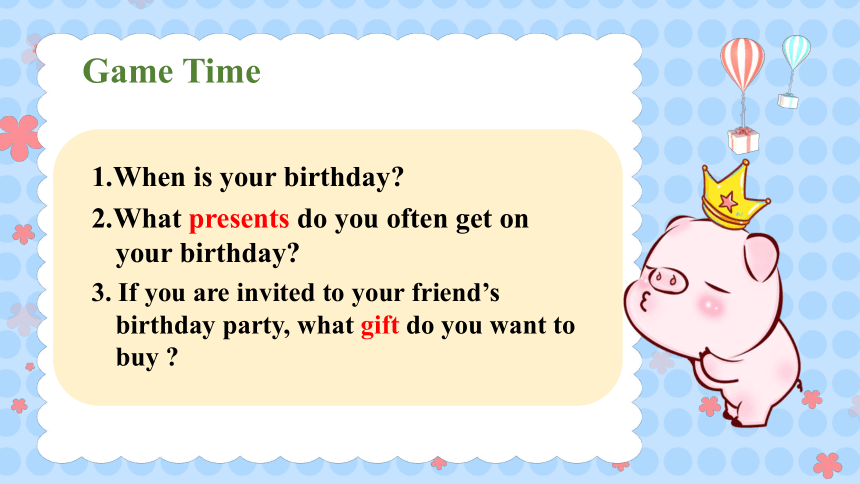
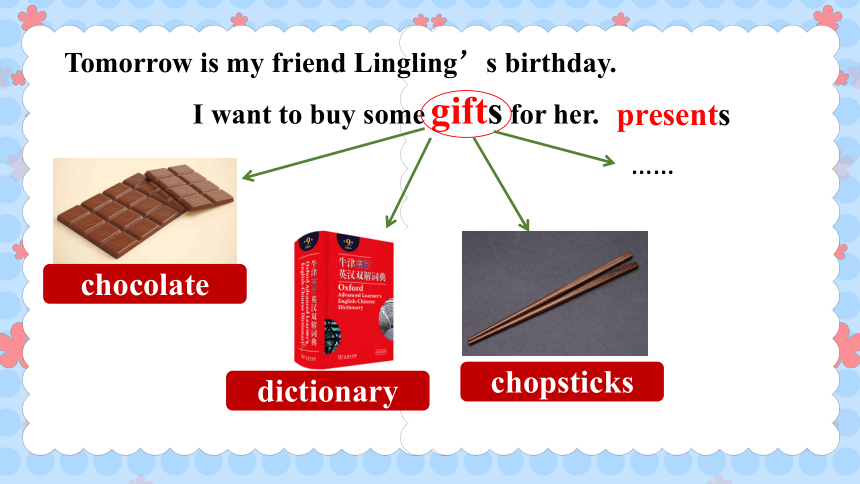
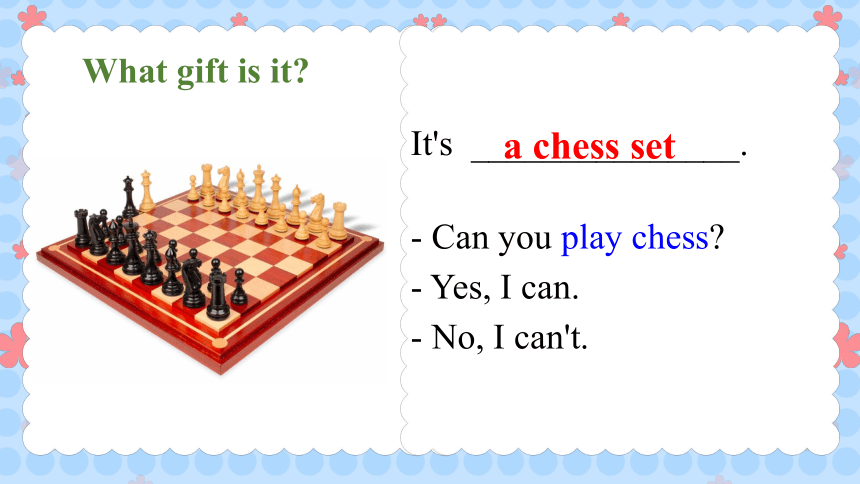

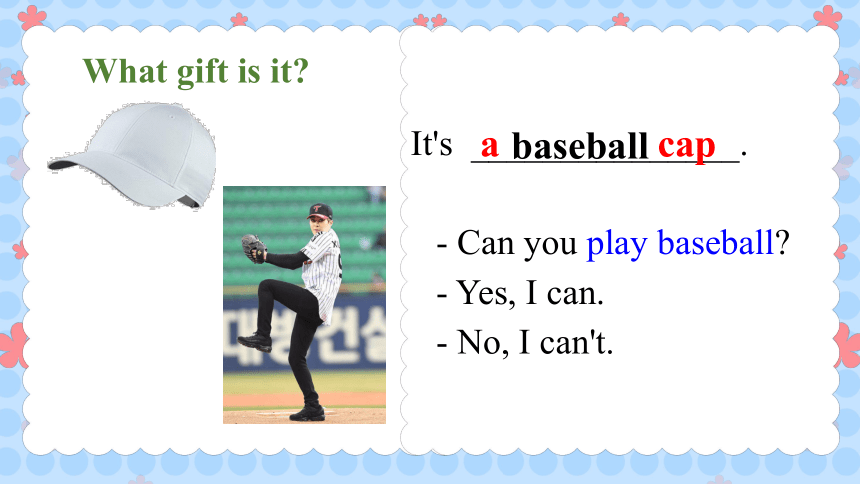
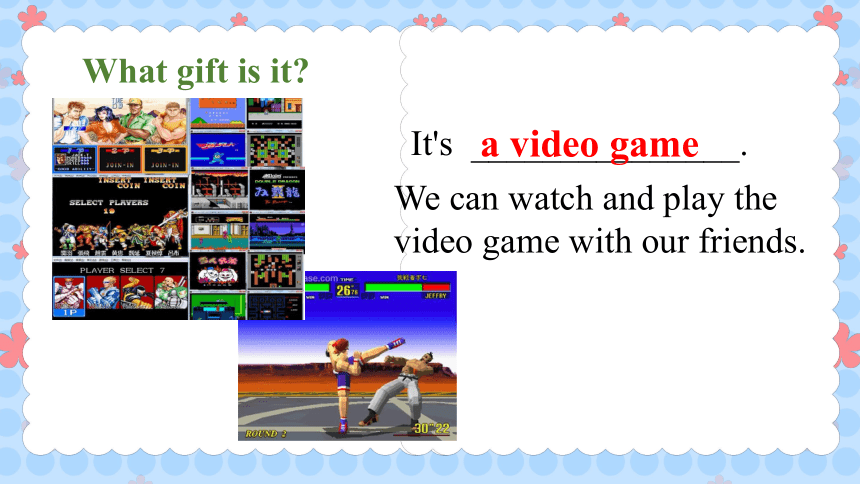


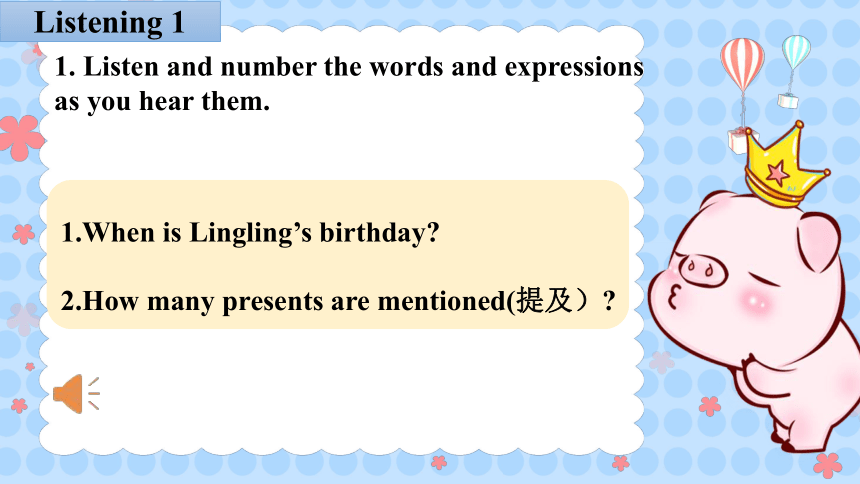
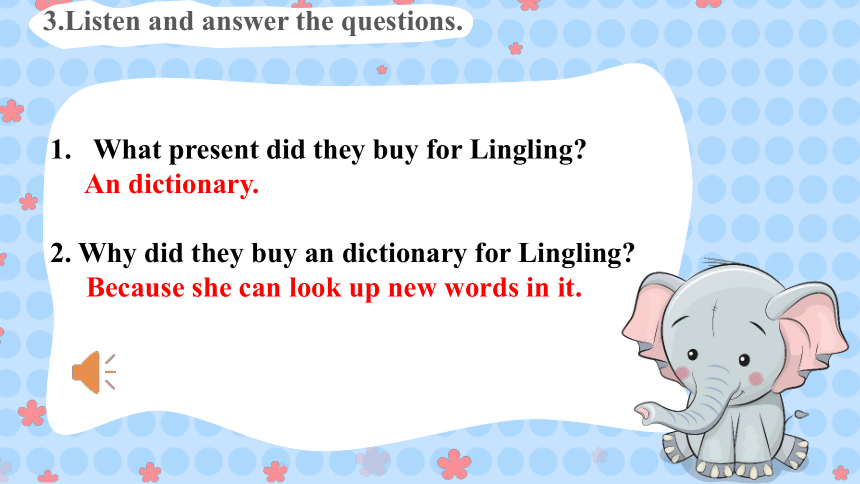

文档简介
(共38张PPT)
Module 11 Way of life
Unit 1 In China, we open a gift later.
CUTE
1.When is your birthday
2.What presents do you often get on your birthday
3. If you are invited to your friend’s birthday party, what gift do you want to buy
Game Time
Tomorrow is my friend Lingling’s birthday.
I want to buy some gifts for her.
presents
chocolate
dictionary
chopsticks
……
What gift is it
It's _______________.
a chess set
- Can you play chess
- Yes, I can.
- No, I can't.
What gift is it
It's _______________.
a toy bear
Children like the toy bear.
What gift is it
It's _______________.
a cap
baseball
- Can you play baseball
- Yes, I can.
- No, I can't.
What gift is it
It's _______________.
a video game
We can watch and play the video game with our friends.
Let's guess what gifts might Lingling receive at last.
We can play chess on it.
It may be a _________.
chess set
Children like them very much.
It can be some _________.
toys/toy bears
People can look up new words in it.
It must be a _________.
dictionary
We can eat it and it tastes good.
It can be some _________.
chocolate
We Chinese eat food with them.
It can be a pair of _________.
chopsticks
It's interesting and exciting.
It can be a _________.
video game
We can wear it on our heads.
It must be a ____________.
baseball cap
1. Listen and number the words and expressions as you hear them.
baseball cap chess set chocolate
chopsticks dictionary toy
video game
1
2
3
4
5
6
7
Listening 1
1. Listen and number the words and expressions as you hear them.
1.When is Lingling’s birthday
2.How many presents are mentioned(提及)
Listening 1
3.Listen and answer the questions.
What present did they buy for Lingling
An dictionary.
2. Why did they buy an dictionary for Lingling
Because she can look up new words in it.
Read and check.
Listening 2
1. Listen and choose.
What are they mainly talking about
A. Different festivals.
B. Different traditions.
C. Different gifts.
That's interesting! I'm interested to know all the Chinese traditions.
2. Listen and choose.
(1) In the USA, when someone gives you a present, you must
open it _____.
A. later B. immediately C. in five minutes
(2) When you accept a present, you must use _____ in China.
A. the left hand B. both hands C. the right hand
(3) When you accept a present, you can use _____ in Britain.
A. both hands B. one hand C. a box
(4) Hongbao in ____ paper is lucky.
A. white B. green C. red
(5) You mustn’t do any ______ on the first day of the Spring Festival.
A. shopping B. cleaning C. cooking
so you needn't wait.
to show your respect.
don't pay much attention to that.
red means luck.
sweep away good luck.
3. Read and check( ) what you usually do in China.
(1) Open a present immediately when you receive it.
(2) Accept a present with both hands.
(3) Use red paper for hongbao.
(4) Do cleaning on the first day of the Spring Festival.
(5) Break something during the Spring Festival.
(6) Have your hair cut during the Spring Festival month.
later
Don't do
Mustn't break anything
Mustn't have
Differences between China and the West
China The West
Difference 1
Difference 2
Open a gift later
Open a gift immediately.
Accept a gift with both hands.
Don't pay much attention to that.
When in Rome, do as Romans do.
In the US, a small gift like a bunch of flowers,
a book or a bottle of wine is enough.
Complete the passage with the words in the box.
accept attention surprise taste traditions
v
n
n
v
n
It is always a(n) (1)___________ to receive gifts from family members and friends. In China, we usually (2)___________ a gift with both hands and open it later. But in the West, people usually do not pay much (3)__________ to that. During the Spring Festival, there are many (4)____________. For example, people in the north of China ear lots of jiaozi. They (5)________ great.
surprise
accept
attention
traditions
taste
Read the passage and Try to find all the sentences with modal verbs (情态动词).
And try to understand their meanings.
情态动词
情态动词后面 + 动词原形
情态动词没有人称和数的变化
I can not play basketball.
I need buy / bought a computer.
She can / cans ride a horse.
Amy need / needs buy a book.
否定式构成是在情态动词后面加 "not"
I can play / played basketball.
can
(能)
用法:
① 表示能力 :
He can speak a little English.
Can you fly
③ 表示请求或允许 :
Can I help you
② 表示猜测 :
That can not be our English teacher,
because she has gone to Shanghai .
could也可表示请求,语气委婉,主要用于疑问句,不可用于肯定句,答语应用can
Could I come to see you tomorrow
Yes, you can. (否定答语可用No, I'm afraid not.)
{
{
{
{
用法:
①表示请求或允许 :
May I go home,please
(1)以may(表许可或请求)开头的一般疑问句,肯定回答用may,否定回答用mustn't或can't. (2)在疑问句中不用于第二人称
② 表示可能性 :
You may be right.
No, you _________
{
{
may
(可以)
Yes, you may.
might为may的过去式,但也可以代替may,语气较为婉转客气或更加不肯定。
You might be right.
might
mustn’t / you can’t.
试比较 :
● You may not smoke here.(不可以) 语气轻
● You can’t smoke here.(不能)重
● You mustn’t smoke here.(决不可)最重
can't
may not
mustn't
↓
用法:
既可以做情态动词, 也可以做实意动词
② 实意动词 (need to do sth) :
① 情态动词 (need do sth)
I need buy a big house.
(需要)
He need drive me home.
Do I need to buy a big house
He needs to buy a big house.
Need I buy a big house
-- Yes, you must.
-- No, you needn’t / don’t have to. (不必要)
-- Yes, you do. /-- No, you don’t.
{
{
need
用法:
② 表示推测“肯定,一定” :
① 表示义务、必要或命令 :
You must come early tomorrow.
---Must I finish my homework first
They must be at home. The light is on.
--- Yes, you must.
--- No, you don't have to/ needn't.
{
must
(必须)
must开头的疑问句,其否定回答通常用 don‘t have to 或needn’t 。而不用mustn't
mustn't
(禁止)
③ 否定时表示 “禁止” :
You mustn’t smoke here.
It’s eleven o’clock . I have to go now .
It was getting dark. He had to finish the work first .
I don’t have to go now .
He doesn’t have to finish the work first.
have to
(必须)
have to 表示客观因素
We are very glad at the party , but it’s 11 , so we have to leave now .
must 表示主观因素
We must study hard to find a good job for ourselves .
must
(必须)
You don't have to tell him about it.
You mustn't tell him about it.
你不一定要把此事告诉他。
你一定不要把这件事告诉他 .
have to
must
My brother was very ill, so I call the
doctor in the middle of the night.
He said that they work hard.
had to
must
区别
}
had better意为“最好”,表示建议和劝告,
简略式为‘d better,否定式为had better not,
后面跟动词原形。
You had better go to see a doctor.
You’d better not stay here.
had better
(最好)
What other Chinese traditions do you know
We must/may do ...
We can't/needn't ...
Think about what you must and mustn’t/ can’t do in the situations. Write notes.
Must Mustn’t/Can’t
At school put up your hand before you talk
At the dining table talk with food in your mouth
Visiting people
In the library
…
eat in class
wait for others to start the meal
bring flowers or a present
be late
be quiet
chat with others
Possible answers:
Good morning, everyone! Today I'd like to tell you some traditions and rules in different situations.
First, when we are in the school, we must/ mustn't/ can/ can't...
Second, when we are at the dining table, we must/ musn't/ can/ can't...
As a middle school student, we must follow the traditions and rules. That's all. Thank you for your listening.
(1)以here, there等副词开头的句子,当其主语是名词时,该句通常使用倒装结构。但当其主语是代词时, 一般不倒装。
There goes the bell. 铃响了。
Look! Here are my father and mother. 看!我的爸爸妈妈来了
(2) gift cn. 礼物=present receive/accept/open a gift
n. 天赋
have a gift for... 有...的天赋
He has a gift for music.
1.Here’s your gift!(教材P88)
Language points
(1) n. 惊讶;惊奇
to one’s surprise 令某人惊讶的是 in surprise
(2) cn. 一件令人惊奇的人或物;惊喜 a big surprise
(3) Vt. 使...惊讶 What he said surprised me.
(4) adj. surprised; surprising
a surprised look/voice 惊奇的表情、声音(与人有关的)
a surprising end 令人惊讶的结尾 (令人惊讶的)
I’m surprised at the surprsing end.
2.What a surprise!(教材P88)
满足两个条件时,可以将否定词前移
(1)主语为第一人称
(2) 动词为think/believe/suppose/expect等词
I don’t believe the earth is round.
3.I don’t think we should open it now.(教材P88)
(1) accept接受(主观上已经接受)
receive 接收 (不知是否接受)
I received a gift from a stranger, but I didn’t accept it.
4. In China you accept a gift with both hands.(教材P88)
用 receive 或 accept 填空 :
He __________ a present yesterday, but he didn't ________ it, because it was too much expensive and he sent it back.
2. I _________ his letter yesterday.
3. He didn't ________ my suggestion.
4. She _________ a good education.
received
accept
received
accept
received
(1)had better do sth/ had better not do sth.
最好做、不做某事
You had better(‘d better) close the door.
(2) have your hair cut 剪头发 (主动表被动)
have sth. done 让某事被 别人做
My bike is broken. I had better have it repaired.
5. You’d better not have your hair cut.(教材P88)
(1)You can’t be serious.= You must be joking.
你不是认真的的吧?
(2) serious adj. 认真的;严肃的;严重的
He is a serious man.
a serious problem
serious pollution
6. You can’t be serious.(教材P88)
Goodbye
CUTE
Module 11 Way of life
Unit 1 In China, we open a gift later.
CUTE
1.When is your birthday
2.What presents do you often get on your birthday
3. If you are invited to your friend’s birthday party, what gift do you want to buy
Game Time
Tomorrow is my friend Lingling’s birthday.
I want to buy some gifts for her.
presents
chocolate
dictionary
chopsticks
……
What gift is it
It's _______________.
a chess set
- Can you play chess
- Yes, I can.
- No, I can't.
What gift is it
It's _______________.
a toy bear
Children like the toy bear.
What gift is it
It's _______________.
a cap
baseball
- Can you play baseball
- Yes, I can.
- No, I can't.
What gift is it
It's _______________.
a video game
We can watch and play the video game with our friends.
Let's guess what gifts might Lingling receive at last.
We can play chess on it.
It may be a _________.
chess set
Children like them very much.
It can be some _________.
toys/toy bears
People can look up new words in it.
It must be a _________.
dictionary
We can eat it and it tastes good.
It can be some _________.
chocolate
We Chinese eat food with them.
It can be a pair of _________.
chopsticks
It's interesting and exciting.
It can be a _________.
video game
We can wear it on our heads.
It must be a ____________.
baseball cap
1. Listen and number the words and expressions as you hear them.
baseball cap chess set chocolate
chopsticks dictionary toy
video game
1
2
3
4
5
6
7
Listening 1
1. Listen and number the words and expressions as you hear them.
1.When is Lingling’s birthday
2.How many presents are mentioned(提及)
Listening 1
3.Listen and answer the questions.
What present did they buy for Lingling
An dictionary.
2. Why did they buy an dictionary for Lingling
Because she can look up new words in it.
Read and check.
Listening 2
1. Listen and choose.
What are they mainly talking about
A. Different festivals.
B. Different traditions.
C. Different gifts.
That's interesting! I'm interested to know all the Chinese traditions.
2. Listen and choose.
(1) In the USA, when someone gives you a present, you must
open it _____.
A. later B. immediately C. in five minutes
(2) When you accept a present, you must use _____ in China.
A. the left hand B. both hands C. the right hand
(3) When you accept a present, you can use _____ in Britain.
A. both hands B. one hand C. a box
(4) Hongbao in ____ paper is lucky.
A. white B. green C. red
(5) You mustn’t do any ______ on the first day of the Spring Festival.
A. shopping B. cleaning C. cooking
so you needn't wait.
to show your respect.
don't pay much attention to that.
red means luck.
sweep away good luck.
3. Read and check( ) what you usually do in China.
(1) Open a present immediately when you receive it.
(2) Accept a present with both hands.
(3) Use red paper for hongbao.
(4) Do cleaning on the first day of the Spring Festival.
(5) Break something during the Spring Festival.
(6) Have your hair cut during the Spring Festival month.
later
Don't do
Mustn't break anything
Mustn't have
Differences between China and the West
China The West
Difference 1
Difference 2
Open a gift later
Open a gift immediately.
Accept a gift with both hands.
Don't pay much attention to that.
When in Rome, do as Romans do.
In the US, a small gift like a bunch of flowers,
a book or a bottle of wine is enough.
Complete the passage with the words in the box.
accept attention surprise taste traditions
v
n
n
v
n
It is always a(n) (1)___________ to receive gifts from family members and friends. In China, we usually (2)___________ a gift with both hands and open it later. But in the West, people usually do not pay much (3)__________ to that. During the Spring Festival, there are many (4)____________. For example, people in the north of China ear lots of jiaozi. They (5)________ great.
surprise
accept
attention
traditions
taste
Read the passage and Try to find all the sentences with modal verbs (情态动词).
And try to understand their meanings.
情态动词
情态动词后面 + 动词原形
情态动词没有人称和数的变化
I can not play basketball.
I need buy / bought a computer.
She can / cans ride a horse.
Amy need / needs buy a book.
否定式构成是在情态动词后面加 "not"
I can play / played basketball.
can
(能)
用法:
① 表示能力 :
He can speak a little English.
Can you fly
③ 表示请求或允许 :
Can I help you
② 表示猜测 :
That can not be our English teacher,
because she has gone to Shanghai .
could也可表示请求,语气委婉,主要用于疑问句,不可用于肯定句,答语应用can
Could I come to see you tomorrow
Yes, you can. (否定答语可用No, I'm afraid not.)
{
{
{
{
用法:
①表示请求或允许 :
May I go home,please
(1)以may(表许可或请求)开头的一般疑问句,肯定回答用may,否定回答用mustn't或can't. (2)在疑问句中不用于第二人称
② 表示可能性 :
You may be right.
No, you _________
{
{
may
(可以)
Yes, you may.
might为may的过去式,但也可以代替may,语气较为婉转客气或更加不肯定。
You might be right.
might
mustn’t / you can’t.
试比较 :
● You may not smoke here.(不可以) 语气轻
● You can’t smoke here.(不能)重
● You mustn’t smoke here.(决不可)最重
can't
may not
mustn't
↓
用法:
既可以做情态动词, 也可以做实意动词
② 实意动词 (need to do sth) :
① 情态动词 (need do sth)
I need buy a big house.
(需要)
He need drive me home.
Do I need to buy a big house
He needs to buy a big house.
Need I buy a big house
-- Yes, you must.
-- No, you needn’t / don’t have to. (不必要)
-- Yes, you do. /-- No, you don’t.
{
{
need
用法:
② 表示推测“肯定,一定” :
① 表示义务、必要或命令 :
You must come early tomorrow.
---Must I finish my homework first
They must be at home. The light is on.
--- Yes, you must.
--- No, you don't have to/ needn't.
{
must
(必须)
must开头的疑问句,其否定回答通常用 don‘t have to 或needn’t 。而不用mustn't
mustn't
(禁止)
③ 否定时表示 “禁止” :
You mustn’t smoke here.
It’s eleven o’clock . I have to go now .
It was getting dark. He had to finish the work first .
I don’t have to go now .
He doesn’t have to finish the work first.
have to
(必须)
have to 表示客观因素
We are very glad at the party , but it’s 11 , so we have to leave now .
must 表示主观因素
We must study hard to find a good job for ourselves .
must
(必须)
You don't have to tell him about it.
You mustn't tell him about it.
你不一定要把此事告诉他。
你一定不要把这件事告诉他 .
have to
must
My brother was very ill, so I call the
doctor in the middle of the night.
He said that they work hard.
had to
must
区别
}
had better意为“最好”,表示建议和劝告,
简略式为‘d better,否定式为had better not,
后面跟动词原形。
You had better go to see a doctor.
You’d better not stay here.
had better
(最好)
What other Chinese traditions do you know
We must/may do ...
We can't/needn't ...
Think about what you must and mustn’t/ can’t do in the situations. Write notes.
Must Mustn’t/Can’t
At school put up your hand before you talk
At the dining table talk with food in your mouth
Visiting people
In the library
…
eat in class
wait for others to start the meal
bring flowers or a present
be late
be quiet
chat with others
Possible answers:
Good morning, everyone! Today I'd like to tell you some traditions and rules in different situations.
First, when we are in the school, we must/ mustn't/ can/ can't...
Second, when we are at the dining table, we must/ musn't/ can/ can't...
As a middle school student, we must follow the traditions and rules. That's all. Thank you for your listening.
(1)以here, there等副词开头的句子,当其主语是名词时,该句通常使用倒装结构。但当其主语是代词时, 一般不倒装。
There goes the bell. 铃响了。
Look! Here are my father and mother. 看!我的爸爸妈妈来了
(2) gift cn. 礼物=present receive/accept/open a gift
n. 天赋
have a gift for... 有...的天赋
He has a gift for music.
1.Here’s your gift!(教材P88)
Language points
(1) n. 惊讶;惊奇
to one’s surprise 令某人惊讶的是 in surprise
(2) cn. 一件令人惊奇的人或物;惊喜 a big surprise
(3) Vt. 使...惊讶 What he said surprised me.
(4) adj. surprised; surprising
a surprised look/voice 惊奇的表情、声音(与人有关的)
a surprising end 令人惊讶的结尾 (令人惊讶的)
I’m surprised at the surprsing end.
2.What a surprise!(教材P88)
满足两个条件时,可以将否定词前移
(1)主语为第一人称
(2) 动词为think/believe/suppose/expect等词
I don’t believe the earth is round.
3.I don’t think we should open it now.(教材P88)
(1) accept接受(主观上已经接受)
receive 接收 (不知是否接受)
I received a gift from a stranger, but I didn’t accept it.
4. In China you accept a gift with both hands.(教材P88)
用 receive 或 accept 填空 :
He __________ a present yesterday, but he didn't ________ it, because it was too much expensive and he sent it back.
2. I _________ his letter yesterday.
3. He didn't ________ my suggestion.
4. She _________ a good education.
received
accept
received
accept
received
(1)had better do sth/ had better not do sth.
最好做、不做某事
You had better(‘d better) close the door.
(2) have your hair cut 剪头发 (主动表被动)
have sth. done 让某事被 别人做
My bike is broken. I had better have it repaired.
5. You’d better not have your hair cut.(教材P88)
(1)You can’t be serious.= You must be joking.
你不是认真的的吧?
(2) serious adj. 认真的;严肃的;严重的
He is a serious man.
a serious problem
serious pollution
6. You can’t be serious.(教材P88)
Goodbye
CUTE
同课章节目录
- Module 1 How to learn English
- Unit 1 Let's try to speak English as much as possi
- Unit 2 You should smile at her.
- Unit 3 Language in use .
- Module 2 My home town and my country
- Unit 1 It's taller than many other buildings.
- Unit 2 Cambridge is a beautiful city in the east o
- Unit 3 Language in use .
- Module 3 Sports.
- Unit 1 Nothing is more exciting than playing tenni
- Unit 2 This year we training more carefully.
- Unit 3 Language in use .
- Module 4 Planes, ships and trains .
- Unit 1 He lives the farthest from school.
- Unit 2 What is the best way to travel.
- Unit 3 Language in use .
- Module 5 Lao She Teahouse.
- Unit 1 I wanted to see the Beijing Opera.
- Unit 2 It descibes the changes in Chinese society.
- Unit 3 Language in use .
- Module 6 Animals in danger.
- Unit 1 It allows people to get closer to them .
- Unit 2 The WWF is working hard to save them all.
- Unit 3 Language in use .
- Revision module A
- Module 7 A famous story
- Unit 1 Alice was sitting with her sister by the ri
- Unit 2 She was thinking about her cat.
- Unit 3 Language in use .
- Module 8 Accidents
- Unit 1 While the car were changing to red, a car s
- Unit 2 I was trying to pick it up when it bite me
- Unit 3 Language in use .
- Module 9 Population
- Unit 1 The population of China is about 1.37 billi
- Unit 2 Arnwick was a city with 200,000 people.
- Unit 3 Language in use .
- Module 10 The weathe
- Unit 1 It might snow.
- Unit 2 The weather is fine all year round.
- Unit 3 Language in use .
- Module 11 Way of life
- Unit 1 In China ,we open a gift later.
- Unit 2 In England, you usually drink tea with milk
- Unit 3 Language in use .
- Module 12 Help
- Unit 1 What should we do before help arrives?
- Unit 2 Stay away from windows and heavy furniture.
- Unit 3 Language in use .
- Revision module B
